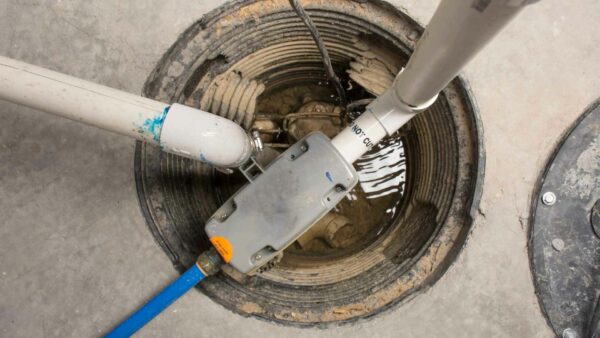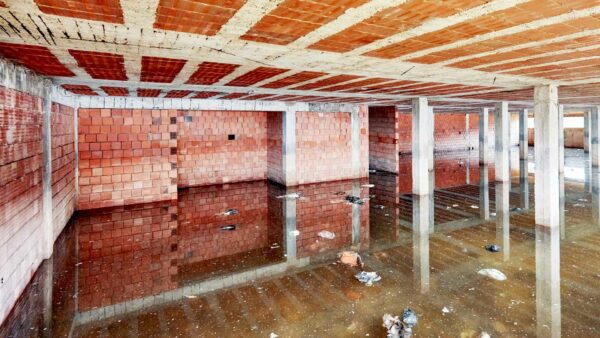
Basement flooding during heavy rain can be a property manager’s worst nightmare, causing extensive damage and costly repairs. Did you know that proper landscaping and maintenance can significantly reduce the risk of such disasters? This article provides practical tips on how to prevent basement flooding, from maintaining sump pumps and drains to strategically redirecting water away from your commercial property.
Let’s dive in, shall we?.
Key Takeaways
- Regularly maintain sump pumps and drains to prevent water buildup in the basement during heavy rain.
- Redirect water away from the commercial property by managing the landscaping and ensuring clean and properly connected downspouts.
- Check and repair foundation cracks promptly to prevent rainwater from seeping into the basement.
- Install a waterproofing system to act as a barrier against water intrusion during heavy rain.
- Consider insurance coverage specifically for basement flooding incidents to protect against potential damages.
Understanding Building Basement Flooding During Heavy Rain
Basement flooding during heavy rain is a common issue that property managers need to address.
Causes of basement flooding
Heavy rainfall isn’t the sole culprit behind basement flooding. While it’s a significant contributor, other factors can exponentially increase your property’s susceptibility to water damage.
Poorly installed or blocked drainage systems often prevent water from being diverted away from the structure, causing accumulation around the foundation and subsequent leaks. Ill-managed landscaping might unintentionally direct water towards your building too, exacerbating issues further.
Cracks in the foundation serve as open invitations for rainwater intrusion, making regular check-ups vital for early detection. Neglecting to seal corners and joints of windows provokes unnecessary dampness down below as well.
Hence, preventing basement flooding necessitates seeking solutions beyond mere weather predictions.
How rainwater gets into the basement
Rainwater invades your basement in ways you may not realize. A common culprit is unsealed points of entry, which can range from cracks in the foundation to gaps around windows or doors.
Too much water pressure on the outside of your building can push water through these vulnerable areas, resulting in a flooded basement.
Sloping terrain and improper landscaping management are other factors that come into play. The grading of your property should direct rainwater away from your building’s foundation.
If it leads towards it instead, heavy rain could mean an inundation downstairs. Similarly, mismanaged downspouts can cause trouble by not directing rainfall far enough away from the structure, allowing water to pool near the base and infiltrate into the basement.
These issues underscore how crucial proactive measures are for preventing basement flooding during heavy rain — such as maintaining clean downspouts and properly sealing your basement against any potential water intrusion points.
Common areas where water seeps in
The journey of rainwater into your basement begins at several common entry points. Failures in the foundation walls pose a significant threat, with any cracks or gaps offering a welcoming route for water intrusion.
Furthermore, basement windows and doors lacking proper sealing turn into portals for unwanted moisture during heavy rain. An often overlooked source of leaks may be tie holes – spots where forms were held when the concrete was poured during construction – which serve as tiny channels allowing water to seep inside your property.
And let’s not ignore the importance of properly connected downspouts; if they’re improperly maintained or clogged, these can channel substantial amounts of stormwater up against your foundation walls instead of directing it away from the structure.
Just by regularly inspecting and maintaining these areas, you can take significant strides in preventing basement flooding during heavy rain.
Tips to Prevent Basement Flooding

Maintain sump pumps and drains regularly to ensure proper functioning and prevent water buildup. Redirect water away from the commercial property by ensuring downspouts are clean and properly connected, and consider installing a French drain for additional protection against basement flooding.
Check and repair any foundation cracks promptly, as they can be potential entry points for rainwater. Install a reliable waterproofing system to safeguard the basement from heavy rain damage.
Lastly, don’t forget to review insurance coverage options that may provide financial protection in case of basement flooding incidents.
Maintain sump pumps and drains
To prevent basement flooding during heavy rain, it is crucial to regularly maintain your sump pumps and drains. These devices play a vital role in managing excess water in your basement, so it’s important to keep them in good working condition.
Inspect the sump pump at least once a year to ensure that it operates properly. Clean out any debris or sediment that may have accumulated in the pit and test the pump by pouring water into it.
Additionally, inspect and clean your drains regularly to prevent clogs that could lead to water backup. By taking these simple maintenance steps, you can help safeguard your property against basement flooding during heavy rainfall events.
Redirect water away from the commercial property
To prevent basement flooding during heavy rain, it is crucial to redirect water away from the commercial property. One effective method is to manage the landscaping around the building.
Ensure that the soil slopes away from the foundation, as this will help direct water flow away from vulnerable areas. Additionally, maintaining clean and properly connected downspouts is essential in routing water away from the foundation.
By extending downspouts further out into the yard or connecting them to an underground drainage system, you can effectively divert excess water away from your property’s basement. Properly managing water flow around your commercial property is a proactive measure that can greatly reduce the risk of basement flooding during heavy rainfall events.
Check and repair foundation cracks
Foundation cracks can be a major entry point for water during heavy rain, leading to basement flooding. It is crucial to regularly check and repair any cracks in the foundation to prevent water from seeping into the basement.
Even small cracks can widen over time, allowing more water to infiltrate your commercial property’s basement. By addressing these cracks promptly, you can significantly reduce the risk of basement flooding during heavy rain.
Properly sealing these cracks will ensure that your commercial property remains dry and protected from potential water damage.
Install a waterproofing system
To protect your commercial property from basement flooding during heavy rain, it is crucial to install a waterproofing system. This system acts as a barrier against water intrusion and helps keep your basement dry.
Waterproofing involves sealing the foundation walls with a waterproof membrane or coating, which prevents water from seeping through cracks and gaps. Additionally, you can also consider installing exterior drainage systems such as French drains or exterior weeping tile systems to redirect water away from the foundation.
With proper waterproofing in place, you can significantly reduce the risk of basement flooding caused by heavy rain and ensure the safety and integrity of your commercial property.
Consider insurance coverage
It’s always important to be prepared for the unexpected, and basement flooding during heavy rain is no exception. That’s why it’s crucial for commercial property managers to consider insurance coverage to protect against potential damages caused by flooding.
Basement flooding can lead to significant repair costs, including damage to walls, flooring, furniture, electrical systems, and more. Having the right insurance coverage can help alleviate some of these financial burdens and provide peace of mind in case the worst happens.
So make sure you review your current insurance policies or consult with an insurance professional who specializes in property management to ensure you have adequate coverage specifically for basement flooding incidents.
What to Do If Your Basement Floods

In the event of basement flooding, take immediate action by removing any valuable items from the flooded area and shutting off electrical power to avoid potential hazards. Ensure personal safety by wearing protective gear such as rubber boots and gloves, and contact professionals specializing in water damage restoration for assistance.
Document the extent of the damage with photos or videos for insurance claims purposes.
Immediate steps to take
If your commercial property basement floods during heavy rain, it’s crucial to take immediate action. First and foremost, ensure your safety by turning off the power supply to the affected area.
Then, remove any valuable items or furniture from the flooded space to prevent further damage. Use a wet/dry vacuum or sump pump to remove standing water as quickly as possible. Be cautious of potential electrical hazards and wear protective gear like gloves and boots when handling contaminated water.
Remember to document the damage for insurance purposes and seek professional assistance if necessary. By taking these immediate steps, you can minimize the impact of basement flooding on your commercial property.
Safety precautions
To ensure the safety of your commercial property and everyone inside during basement flooding, it is important to take certain precautions. First and foremost, make sure to turn off all electricity in the affected area to avoid any potential electrocution hazards.
If you suspect that the water might be contaminated, wear protective gear such as rubber boots and gloves when entering the basement. Additionally, be cautious of slippery surfaces and use proper lighting to navigate through the flooded area.
Lastly, if you are unsure about the condition of your building’s structure or if there is a risk of collapse, evacuate immediately and seek professional assistance. Safety should always be a top priority in any emergency situation.
Contacting professionals for assistance
If your basement does end up flooding during heavy rain, it’s important to contact professionals for immediate assistance. They have the expertise and equipment necessary to safely handle the situation and minimize damage.
Flood restoration specialists can help remove standing water, dry out the affected area, and assess any potential structural issues. Additionally, contacting your insurance provider as soon as possible will ensure that you can start the claims process promptly.
Remember, acting quickly is crucial in preventing further damage and getting your property back to normal.
Documenting damage for insurance claims
In the unfortunate event that your basement floods during heavy rain, it’s crucial to document the damage for insurance claims. Before anything else, it’s important to prioritize safety and ensure that the area is safe to enter.
Once it’s safe, take clear and detailed photographs of the affected areas. Be sure to capture any visible signs of water damage, such as standing water levels or soaked walls.
Next, create a comprehensive inventory of damaged items in your basement. This includes listing any furniture, appliances, or personal belongings that have been impacted by the flooding.
Take note of their condition before and after the incident.
It’s also essential to keep all receipts related to repairs and cleanup efforts. This can include invoices from professional services hired and materials purchased for restoration purposes.
Conclusion
In conclusion, by taking proactive steps to prevent basement flooding during heavy rain, commercial property managers can avoid costly damage and ensure the safety of their tenants.
Regular maintenance of sump pumps and drains, redirecting water away from the property, checking for foundation cracks, installing a waterproofing system, and considering insurance coverage are all essential strategies in protecting against basement flooding.
If flooding does occur, immediate action should be taken to mitigate further damage and professional assistance should be sought. Remember, prevention is key when it comes to keeping basements dry during heavy rain.
FAQs
1. What are some common causes of basement flooding during heavy rain?
Basement flooding during heavy rain can be caused by factors such as poor drainage systems, cracks or leaks in the foundation walls, clogged gutters and downspouts, and improper grading around the property.
2. How can I prevent basement flooding during heavy rain?
To prevent basement flooding during heavy rain, you can take measures such as installing a sump pump system, ensuring proper gutter maintenance and downspout extensions to direct water away from the foundation, sealing any cracks or gaps in the foundation walls, and improving overall property drainage.
3. Is it necessary to hire a professional for basement flood prevention?
While some preventive measures can be done by homeowners themselves, it is recommended to consult with a professional specializing in basement waterproofing and drainage systems. They have expertise in assessing potential vulnerabilities and implementing effective solutions tailored to your specific property.
4. How often should I inspect my property for potential flood risks?
It is advisable to regularly inspect your property for potential flood risks at least once a year or after significant weather events. This allows you to identify any areas that need attention or improvements before they become more severe problems leading to basement flooding during heavy rainstorms.
Find Contractors Using BidSource
Property managers can use BidSource to have our team find a contractor ready to assist with your property maintenance. Share your job details using the form below and our team will be in touch with a qualified contractor!job


